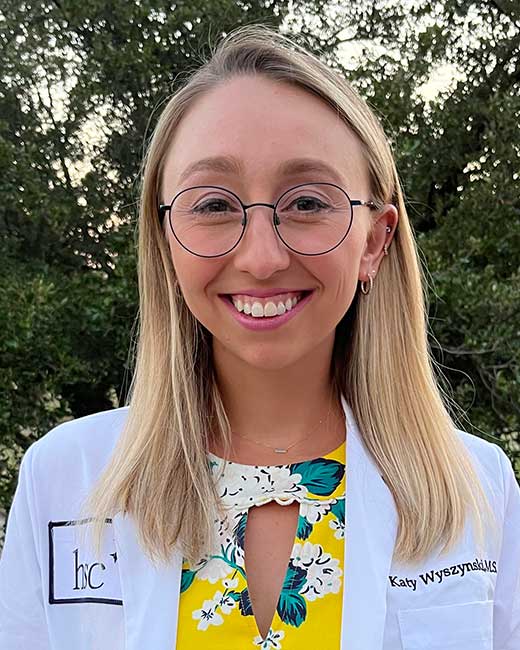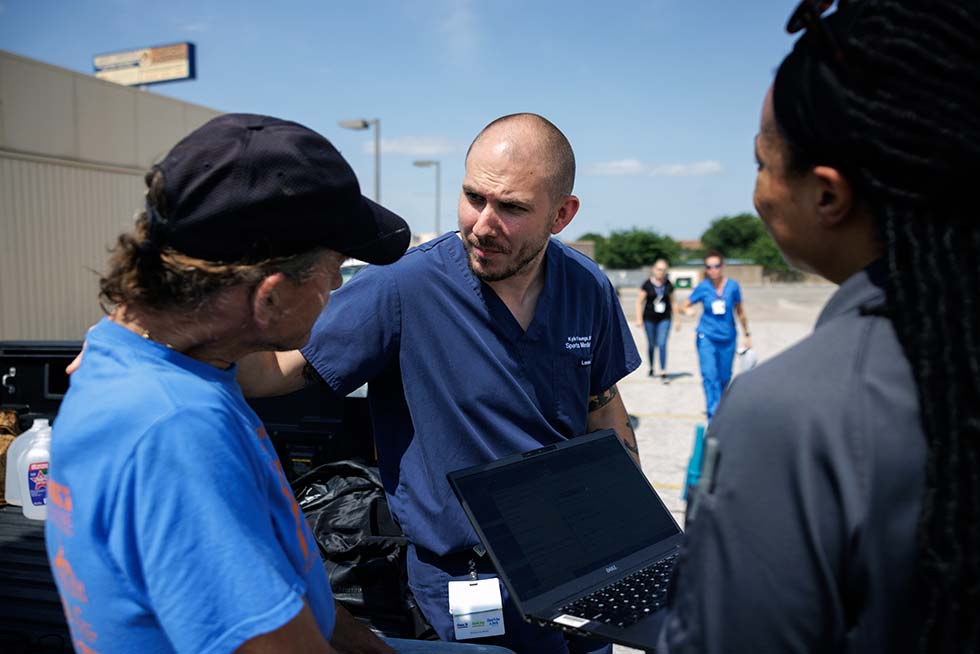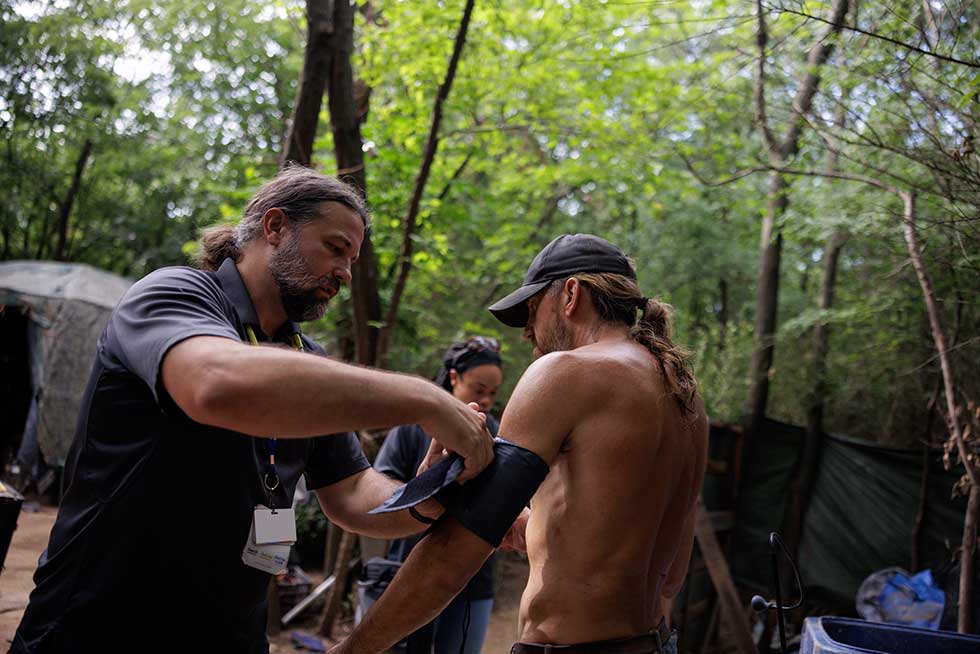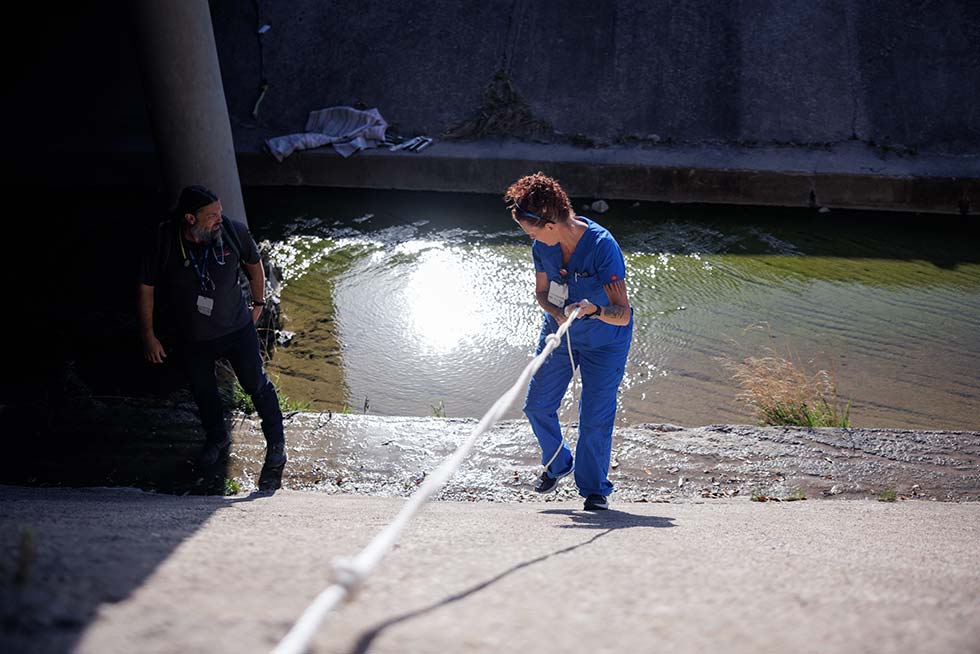Street Medicine Program at John Peter Smith
As a medical student at my first shift on a new clinical rotation, I am constantly nervous that I’m at the wrong spot at the wrong time. I cautiously walk into the Street Medicine office and am greeted by three friendly faces. A large TV screen mounted to the wall is projecting the hospital system’s electronic medical record, and I watch as the team creates of list of patients to see. It looks analogous to a schedule of patients at a family medicine office. However, instead of street addresses in the charts, there are phrases like “usually stays under the bridge” or “last seen at the encampment behind the Texaco gas station.” After creating the patient list and map for the afternoon, we hop in the van and start our journey to find our first patient. Street medicine is the practice of providing medical care to unsheltered people experiencing homelessness in locations like encampments, parks, and under bridges. The goal is to bring services out of the hospital or clinic and provide care directly on the street or encampment, to meet people where they are, and to prevent medical conditions from deteriorating. The concept of bringing healthcare to patients, whether in a house or on the streets, is not a novel concept. However, street medicine became more formalized by Dr. Jim Withers, an internal medicine physician who started street rounds in Pittsburgh in 1992. When he began street rounds, he had two mottos: “don’t dress like doctor” and “don’t act like an asshole.”
Once Dr. Withers created the Street Medicine Institute, a 501(c)3 non-profit, the street medicine movement skyrocketed. More and more street medicine teams were created within healthcare networks, like the one in Fort Worth through John Peter Smith (JPS) Hospital. In 2013, JPS began hiring folks to work exclusively on the street medicine team and was fully operational by 2014. The goal was to bring primary care to people experiencing homelessness, and to reduce unnecessary and inappropriate healthcare system utilization. Currently, the team is staffed by social workers and medical providers that work Monday through Friday and will often be joined by resident physicians or medical students for a shift. Each day of the week is dedicated to a particular geographic region of Fort Worth, which helps provide consistency to the patients. The patient list is created and adjusted daily so the team can prepare for these visits and bring the necessary equipment such as blood draw kits. The foundation of the work at JPS is to follow with patients regularly to increase access to healthcare and reduce poor outcomes that can regularly accompany homelessness. The afternoon I rode along with the JPS street medicine team, we were unsuccessful at finding our first patient. It appeared like the shelter was still in place, but no one had seen our patient that day. We drove to our next site and parked behind a gas station. With no signs of life close by, I was a bit puzzled. I followed the team through a patch of grass and hiked for a bit until we found an encampment hidden within the trees. Soon, multiple dogs were running up to us closely followed by their owners who yelled out “Hey Joel!” These folks knew JPS and Joel well, and were friendly enough to start talking to the rest of us like we were long lost friends.
Joel Hunt, PA-C, is the director of Acclaim Street Medicine, the team associated with JPS. He has been with the team in Fort Worth since its origin, and just about every patient that comes through JPS knows his name. Joel has been crucial in building and maintaining trust with the community of unsheltered persons. In the past few years, the team has been growing and now includes Dr. Chad Holmes and Dr. Hunter Scarborough. Dr. Holmes, DO, FACEP, is emergency medicine faculty at JPS and the director of the street medicine fellowship. Dr. Scarborough, MD, recently completed the street medicine fellowship and is now emergency medicine faculty as well at JPS. While the primary goal of street medicine at JPS is to provide longitudinal care focused on the management of complex medical conditions, this team is transforming the emergency department (ED) at JPS as well. When a patient comes through the ED and is identified as unsheltered, emergency medicine residents and attendings can refer that patient to the street medicine team. There is often a warm hand-off between EM and street medicine, providing patients better follow-up care and hopefully minimizing subsequent emergency department visits. Vice versa, there is direct communication to EM physicians when a street medicine patient requires emergency care. With this shift in culture, street medicine patients tend to have a better experience coming to the ED. By working in collaboration with street medicine, EM physicians have increased awareness of the state of homelessness in Fort Worth and what specific things can be done during an ED visit and after discharge for this specific patient population. Street medicine has become integrated into the curriculum for both emergency medicine and family medicine residents at JPS. EM residents have longitudinal street medicine didactics throughout the year, as well as elective time to work with the street medicine team. Furthermore, JPS is the only program in Texas that offers a Street Medicine fellowship, a one-year self-funded fellowship open to graduates of emergency medicine, family medicine, and internal medicine. This opportunity allows physicians to practice the entire scope of street medicine, as well as learn about systems medicine, interact with partner community agencies, teach residents and medical students, along with continue practice in the provider’s original area of training.
Flashback to my clinical shift with the street medicine team, and I returned to my car after a busy afternoon of seeing patients mostly in encampment settings. I was so excited to go home and take a cold shower, after walking around for hours in 100-degree heat. I was quickly reminded that our patients don’t have luxury and would remain outside all afternoon and evening. I was hopeful that the gallons of water and packets of electrolytes we distributed would help keep them hydrated for a few days, but it’s inevitable some would show up in the emergency room from heat exhaustion or dehydration. That is the reality of being unsheltered in the Texas summer. I walked through those garage doors as I leave my shift for the day and see a smattering of phrases written on the wall. This cannot be taught in the classrooms of medical school but is evident through street medicine. PA Joel, Drs. Holmes and Scarborough emanate humility whether they are seeing patients under a bridge or in the emergency department. I am lucky to have worked with the street medicine team a handful of times in my third year of medical school, and each shift leaves me a bit more humble about my role in the healthcare system. I hope to grow in my compassionate care of patients both in and outside of the hospital setting. Photos courtesy of JPS Health Network *If you are interested in the JPS Street Medicine Fellowship, more information can be found at https://fortworthem.com/fellowships/ *If you would like to learn more about starting a street medicine group for your medical students or within your hospital system, Street Medicine Institute has free resources https://www.streetmedicine.org/ |




